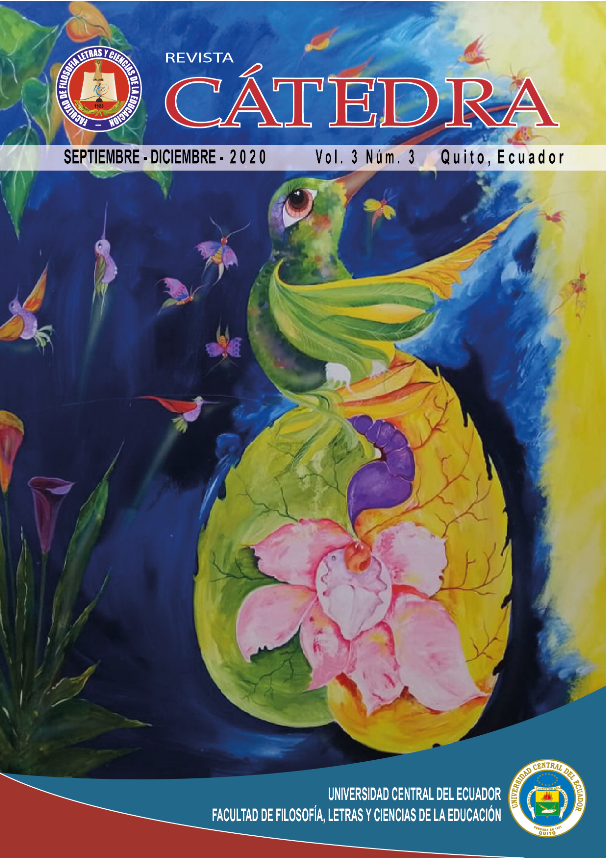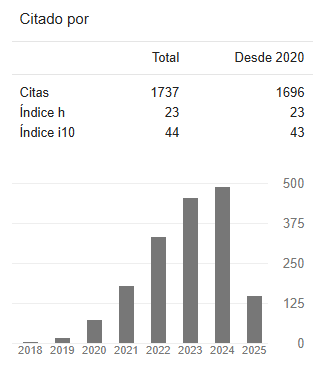The Taptana or indigenous counter as a learning strategy in basic mathematical operations
DOI:
https://doi.org/10.29166/catedra.v3i3.2428Keywords:
Indigenous accountant, teaching learning, basic operations, TaptanaAbstract
The learning of Mathematics manifests itself as a problem that needs to be observed, studied and approached from multiple perspectives in order to understand the phenomenon and act on it. From diverse educational theories, the use of didactic materials is proposed to promote an optimal level in the understanding of mathematical processes and the acquisition of the fundamental concepts of this science.
The Taptana or indigenous accountant refers to the pre-Hispanic cultural heritage of the ancient inhabitants of the current territory of Ecuador. Its origin possibly goes back to the Cañari culture, Tacalzhapa phase, 500 B.C., (Uhle, 1922). In the 80's, the Research Center for Indigenous Education (CIEI) recreated this artifact, resulting in innovative didactic material used especially in what until a few years ago was known as the Intercultural Bilingual Education System.
The present study investigates the effectiveness of the Taptana, as a mathematical instrument for the teaching-learning of basic mathematical operations. We worked with students from two parallel, A and B, belonging to the fourth year of Basic General Education of the José María Velasco Ibarra Educational Unit, a fiscal institution located in the northern center of the city of Quito. The qualitative methodological research was developed in the months of September, October and November 2019.
The effectiveness of the Taptana was demonstrated. It is concluded that it improves the understanding and learning of the decimal system and basic mathematical operations.
Downloads
References
Alburquerque, A., (1953). Metodología da Matemática, Río de Janeiro: Ed. Conquista.
Britton, J. y Bello, I., (1982). Matemáticas Contemporáneas, México, D.F. : HARLA S.A. de CV. p.190.
Butsch, G. Calero, V. Muenala, H., (1998). El contador indígena: (Taptana). Quito, Ministerio
de Educación y Cultura.
Coll, C., (1981). Psicología genética y educación, Barcelona, oikos-tau, s.a. ediciones.
D’Amore, B., (2017). Enseñanza y aprendizaje de las matemáticas: problemas semióticos, epistemológicos y prácticos, Bogotá, Universidad Distrital Francisco José Caldas.
Educación en Ecuador, Resultados de PISA para el Desarrollo, INEVAL, (2018) http://www.evaluacion.gob.ec/wp-content/uploads/downloads/2018/12/CIE_InformeGeneralPISA18_20181123.pdf
López, P. y Fachelli, S., (2015). Metodología de la Investigación Social Cuantitativa, Barcelona, UAB.
More tan one-half of children and Adolescents Are Not Learning Worldwide, Unesco Institute for Statistics. p.7.
Muenala, H., (1989). Quimsa Yupaicamayuc Camu, Quito: Convenio MEC-GTZ-CONAIE.
Rousseau, J., (1985). Emilio o De la educación, Edaf, S.A.
Tercer Estudio Regional Coparativo y Explicativo, TERCE, Unesco, 2013 https://unesdoc.unesco.org/ark:/48223/pf0000227501
Uhle, M., (1922). Sepulturas ricas en oro en la provincia del Azuay, Boletín de la Sociedad Ecuatoriana de Estudios Históricos, 4(12): 108-114, Quito.
UNICEF, 2017. 617 millones de niños y adolescentes no están recibiendo conocimientos mínimos en lectura y matemática.
Valiente, T. y Küper, W. (1998). Pueblos Indígenas y Educación, Quito: Abya-Yala.
Yánez, C. (1996). La educación indígena en el Ecuador, Instituto de Capacitación Municipal: Ecuador, Ediciones de la Universidad Politécnica Salesiana.
Downloads
Published
Versions
- 2021-01-21 (5)
- 2021-01-21 (4)
- 2021-01-07 (3)
- 2020-09-30 (2)
- 2020-09-29 (1)









